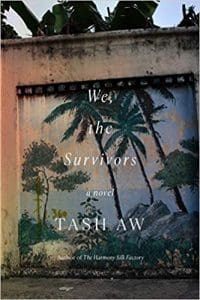The latest novel by Man Booker long-listed author Tash Aw offers a grim portrait of contemporary Asia under late capitalism. We, the Survivors (336 pages; FSG) traces the life of Ah Hock, a Malaysian-born citizen of Chinese heritage living a quiet life of solitude on the other side of a murder sentence. Ah Hock relays his story to a young journalist looking to shed light on the circumstances that led to Ah Hock’s violent crime, a crime he himself doesn’t quite understand. The murder is ultimately connected to Ah Hock’s former career as second-in-command at a local fish farm, as well as his longtime friendship with Keong, a hotheaded boy from his childhood village.
By most appearances, Ah Hock was once the portrait of success: raised by a single mother and accustomed to backbreaking labor in his youth, he eventually settled down with a wife and worked his way up the ranks at a booming fish farm. Yet his achievements do little to relieve the pressures of working class life at a time in Malaysia when climate change is rapidly affecting agricultural industries, and companies are increasingly relying on undocumented workers.
Ah Hock manages the foreign employees at the fish farm; these men, from countries such as India and Bangladesh, are often susceptible to illness and death due to strenuous labor, low wages, and poor living conditions. The migrant workers are treated as outcasts, even by Ah Hock. But for all of Ah Hock’s success, he is not so dissimilar to these workers, suffering as they do from the illusion that upward mobility is within reach. In reality, they are at the mercy of countless economic factors entirely outside their control:
“…the feeling of anxiety, the knowledge that the entire town depended on trade from faraway places, goods being bought and sold by people we would never know. Some politician in America decides that they can’t buy Malaysian rubber gloves; suddenly ten factories in the area have to shut down. The Europeans want to save the fucking planet so they ban the use of palm oil in food; within a month the entire port is on its knees. Life continues, but you feel it slipping quietly away, and you worry that it’ll never return. And because of that fear, you feel caught in a suspended state. On the outside, life seems normal, but inside it’s drawn to a standstill.”
Told in a conversational tone, We, the Survivors is peppered with pop culture references to Hong Kong stars like Andy Lau and Leslie Cheung, and presents a matter-of-fact acceptance of life’s harsh circumstances. Through their repeated interviews, Ah Hock develops something like a fatherly affection for the young woman recording his narrative, though there remains between them an invisible barrier defined by her privileged background and urban life versus his more rural, impoverished existence.
Tash Aw’s skills as a writer lull us into a sense of comfortable familiarity with Ah Hock, which registers as disturbing when one remembers he is a convicted murderer. There are no easy answers at the end of We, the Survivors—and there shouldn’t be: this is a stark rendering of Southeast Asia in the 21st century, a region barreling toward an uncertain future at the speed of modernity. It’s an outlook shaped by the ravages of climate change, by a society that treats its migrant population something subhuman, and by rampant corruption. Yet thanks to Ah Hock’s striking voice, the novel is never less than a pleasurable read.

